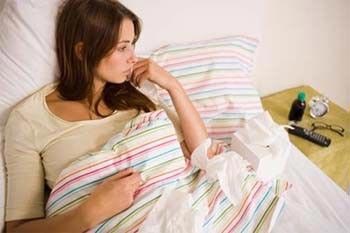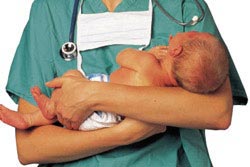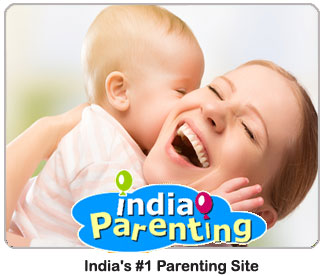Post delivery bleeding may turn to post delivery haemorrhage due to some problems. Understand the causes of post delivery haemorrhage and know how to cope with it. Before going in on how to cope with post delivery haemorrhage, it is important to understand how post delivery bleeding is different from post delivery haemorrhage. Post childbirth, a certain amount of bleeding is natural. This is because the excess blood is getting eliminated from the uterus and the placental tissues are being gradually discarded by the body. Bleeding happens after delivery due to the separation of the placenta from the uterus that results in ruptured blood vessels. This bleeding is a continuous process that goes on for a few days. There is also a certain amount of vaginal discharge that accompanies the bleeding, which is commonly referred to as the lochia. Meanwhile the placenta is gradually expelled through a steady contraction of the uterus. Once the expulsion is complete, the blood vessels of the adjoining area also close off due to the uterine contractions. This is how the bleeding stops. Under normal circumstances, this locia continues for 2-6 weeks. In this articleWhen Does the Normal Bleeding turns to Post delivery Haemorrhage? RestNutritious DietFrequent Washroom VisitsAvoid TamponsKeep Yourself HydratedWhen Does the Normal Bleeding turns to Post delivery Haemorrhage? If the aforementioned contraction of the uterus does not take place as expected, the bleeding will continue and will be out of control. This is when the condition is referred to as post delivery haemorrhage. The haemorrhage might happen also when a part of the placenta is left behind in the body. Another reason that results in this condition is when the uterus fails to expel the amniotic sac and it stays back in the body. Given below are some other reasons that cause post delivery haemorrhage:The placenta gets detached from the body prior to the desired timeA prolonged labourCertain types of infectionsMultiple pregnanciesIf the baby happens to be large, that is overgrown in sizeTear and lacerations in the vaginal tissuesAny type of trauma caused to the vagina, uterus or cervix during the labour and delivery processAny variant of blood clotting disorderMethods to Cope with Post delivery Haemorrhage Let us have a look at the methods for coping with post delivery haemorrhage. Rest This is the basic and perhaps the most effective mechanism to deal with the condition. It not only helps in the effective recovery from the stress and trauma of childbirth, but also allows the body to recuperate the entire harrowing session right from the pregnancy to delivery. After all in the entire process of pregnancy, the body has gone through major changes. Nutritious Diet A healthy diet that incorporates all the desired nutrients and minerals can induce a dramatic well-being in the physical and mental aspects of the mother. An effective diet helps the body to gain back its strength to adapt to the changes and aid recovery faster. Frequent Washroom Visits This is important. At no point of time should the woman allow her urinary bladder to stretch and fill up. Post childbirth, there is a considerable reduction in the sensitivity of the urinary bladder. Therefore, the urge to urinate gets reduced even if it is full. So, one must make it a point to relieve herself quite often. Otherwise, there is a huge possibility of the cropping of urinary problems, if the bladder is not emptied for a long period. Avoid Tampons It is advisable to opt for sanitary napkins during the bleeding. Post delivery haemorrhage marks bleeding that is heavier than the usual menstrual bleeding. So you might require changing the pads very frequently. Tampons should be avoided as they enhance the risk for infections. Keep Yourself Hydrated Apart from the medications provided by the physician, you can aid yourself by keeping your system hydrated as much as possible. This helps the medicinal, nutritional and vitamin supplements to work more effectively. Finally, while coping with post delivery haemorrhage, you must retain your calm. If you grow hyper you will increase your mental stress which can only aggravate the condition. Your mental calmness will help you to cope with the condition more effectively.
Post delivery bleeding may turn to post delivery haemorrhage due to some problems. Understand the causes of post delivery haemorrhage and know how to cope with it. Before going in on how to cope with
post delivery haemorrhage, it is important to understand how post delivery bleeding is different from post delivery haemorrhage. Post
childbirth, a certain amount of bleeding is natural. This is because the excess blood is getting eliminated from the uterus and the placental tissues are being gradually discarded by the body.
Bleeding happens after delivery due to the separation of the placenta from the uterus that results in ruptured blood vessels. This bleeding is a continuous process that goes on for a few days. There is also a certain amount of vaginal discharge that accompanies the bleeding, which is commonly referred to as the lochia.
Meanwhile the placenta is gradually expelled through a steady contraction of the uterus. Once the expulsion is complete, the blood vessels of the adjoining area also close off due to the uterine contractions. This is how the bleeding stops. Under normal circumstances, this locia continues for 2-6 weeks.
When Does the Normal Bleeding turns to Post delivery Haemorrhage?
If the aforementioned contraction of the uterus does not take place as expected, the bleeding will continue and will be out of control. This is when the condition is referred to as post delivery haemorrhage. The haemorrhage might happen also when a part of the placenta is left behind in the body. Another reason that results in this condition is when the uterus fails to expel the amniotic sac and it stays back in the body. Given below are some other reasons that cause post delivery haemorrhage:
- The placenta gets detached from the body prior to the desired time
- Certain types of infections
- If the baby happens to be large, that is overgrown in size
- Tear and lacerations in the vaginal tissues
- Any type of trauma caused to the vagina, uterus or cervix during the labour and delivery process
- Any variant of blood clotting disorder
Methods to Cope with Post delivery Haemorrhage
Let us have a look at the methods for coping with post delivery haemorrhage.
Rest
This is the basic and perhaps the most effective mechanism to deal with the condition. It not only helps in the effective recovery from the stress and trauma of childbirth, but also allows the body to recuperate the entire harrowing session right from the pregnancy to delivery. After all in the entire process of pregnancy, the body has gone through major changes.
Nutritious Diet
A healthy diet that incorporates all the desired nutrients and minerals can induce a dramatic well-being in the physical and mental aspects of the mother. An effective diet helps the body to gain back its strength to adapt to the changes and aid recovery faster.
Frequent Washroom Visits
This is important. At no point of time should the woman allow her urinary bladder to stretch and fill up. Post childbirth, there is a considerable reduction in the sensitivity of the urinary bladder. Therefore, the urge to urinate gets reduced even if it is full. So, one must make it a point to relieve herself quite often. Otherwise, there is a huge possibility of the cropping of urinary problems, if the bladder is not emptied for a long period.
Avoid Tampons
It is advisable to opt for sanitary napkins during the bleeding. Post delivery haemorrhage marks bleeding that is heavier than the usual menstrual bleeding. So you might require changing the pads very frequently. Tampons should be avoided as they enhance the risk for infections.
Keep Yourself Hydrated
Apart from the medications provided by the physician, you can aid yourself by keeping your system hydrated as much as possible. This helps the medicinal, nutritional and vitamin supplements to work more effectively.
Finally, while coping with post delivery haemorrhage, you must retain your calm. If you grow hyper you will increase your mental stress which can only aggravate the condition. Your mental calmness will help you to cope with the condition more effectively.


























